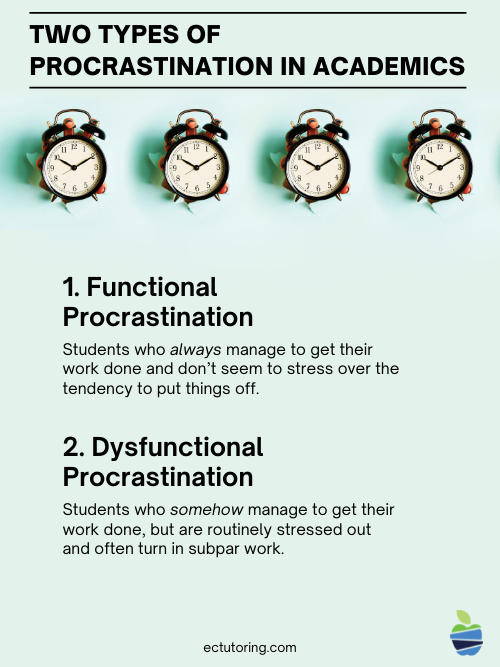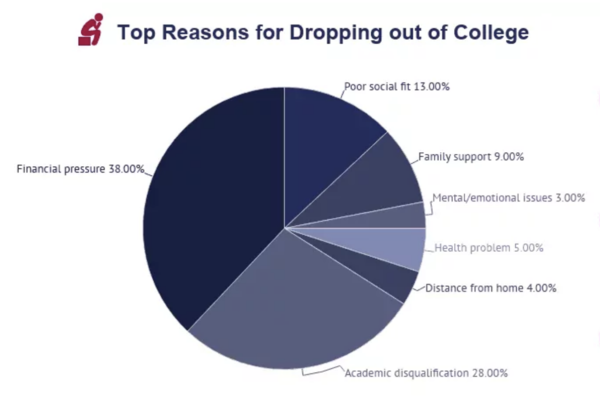I once worked with a college sophomore from McLean, VA named Sarah, who had failed out of James Madison University due to her poor time management skills. She was a solid student in high school, given that it was a very structured environment. Once she had so much free time in college, havoc ensued. She was a procrastinator and these habits ate away at her self-esteem.
In this blog, we’ll explore the reasons why many students, like Sarah, fall into the procrastination trap and how to help them find a way out.
What researchers say about procrastination
Sarah certainly isn’t alone in her struggles to stay on task. An estimated 70% of all students in North America procrastinate, according to researchers at the American Psychological Association. This can lead to late-night cram sessions, lower grades, and higher stress.
The numbers are even more alarming on college campuses where students suddenly find themselves with a whole lot of freedom and a growing workload. Researchers at The University of Calgary found between 80% and 95% of college students admit to procrastinating on coursework.
The reasons behind procrastination vary, but many educators and researchers will tell you that most college students aren’t doing it because they’re unmotivated or don’t care about their work. It’s often due to poor time management, fear of failing, or confusion about where to even start. The implications of chronic procrastination in higher ed can include dropped classes, wasted tuition money, or worse.
Today 1 in 3 students who enroll in college still won’t have a bachelor’s degree six years later. That’s according to the National Center for Education Statistics. Financial issues top the list of reasons why students drop out, but the unhealthy habit of procrastination and poor grades prevent many other students from ever earning a degree.
The Two Types of Academic Procrastination
My experience has been that there are two types of procrastination when it comes to schoolwork – functional and dysfunctional.

Functional procrastinators always manage to get their work done and don’t seem to stress over their tendency to put things off. Let’s say your son has a math assignment due on Friday. He doesn’t start it until 9 pm on Thursday night, but he completes it even though he has to stay up late. This type of procrastination is functional.
But what if your daughter had two weeks to write a research paper that was due on February 25th and she did not start it until late on the 23rd? She still needs to write her thesis, gather research, create an outline, etc. Although she somehow manages to get it done, the quality is suspect at best, she’s stressed out of her mind, and you are furious with yet another last-minute project. That’s dysfunctional procrastination.
And although some kids learn from their mistakes, others don’t.
Poor Executive Function is Often an Underlying Reason
When I started working with Sarah, she had transferred from James Madison to Old Dominion University. Although things were better at her new school, they still weren’t great.
Sarah was actually trying very hard. She would often plop herself down in the library for two hours straight, but she got nothing done by the end of the two hours. In a nutshell, she felt overwhelmed and underprepared. She had no strategies to get started even though she was in the right environment (the library).
This scenario occurred over and over again even though she swore she would do better next time. Sarah engaged in this vicious cycle of negative self-talk. Comments like, “I’m just lazy” or “Why can’t I just do this? I’m a loser” were common. The more she beat herself up, the worse the problem became.
When I met Sarah she was on academic probation. I started working with her on executive function skills and helped her to lower her expectations of working diligently for two hours. She needed to minimize the barrier to entry by just working for 5 or 10 minutes to start.
Sarah picked up many more strategies, but perhaps the most important one was that she learned to forgive herself.
Two Effective Ways to Help a Procrastinator
1. Curing Procrastination with Forgiveness
It’s typical for people to become demoralized when procrastination is the norm. When this behavior occurs frequently, students (and adults) usually get angry with themselves for lack of initiative. But studies show this negative dialogue makes the problem worse.
In a study by Dr. Michael Wohl at Carlton University, college freshmen who had the habit of engaging in self-doubt were randomly put into two groups prior to an exam. After the test, one group was instructed in the art of forgiveness. Instead of beating themselves up for putting off studying, they forgave themselves. The students who forgave themselves procrastinated far less than the other group when it came to studying for the next exam.
2. Time Travel as a Solution to Procrastination

Another strategy, researched by Fuschia Sirois from Bishop’s University in Quebec, is called “time travel.” Sirois studied the mindsets of 4,000 people. He found that those who could project themselves into the future, and imagine how great it would feel to finish a task, were more likely to ward off procrastination.
And it wasn’t only good thoughts they were trained to imagine. They also thought about how awful they would feel if they gave in to the “I’ll do it later” syndrome. Visualization is a common strategy used for athletes and it can be just the ticket for procrastinators, too.
How to Get Your Student Help
Although Sarah still put tasks off from time to time, her dysfunctional procrastination became functional and her grades skyrocketed as we worked together to strengthen her executive function skills. What made me the happiest was that she had a new outlook on school!
If procrastination is impacting your child’s grades and mindset or leading to tension and conflict, a skilled executive function coach can help. Our EF coaches focus on research-based strategies to get students of all ages organized, motivated, and on a path to developing effective habits for lasting change.



